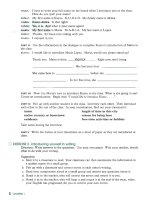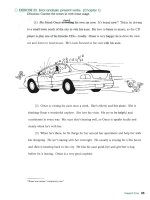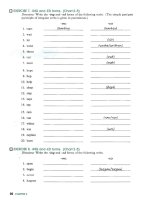Fundamentals of english grammar third edition part 13 potx
Bạn đang xem bản rút gọn của tài liệu. Xem và tải ngay bản đầy đủ của tài liệu tại đây (363.72 KB, 7 trang )
5.
A:
You haven't seen my passport, have you?
B: No.
Why?
A:
I need it because I
for Taipei next Monday.
B: Oh? How long
will
you be there?
A:
A week. I
the first few days with my brother, who
to school there. After that
I
some
old fiiends
I
went to school
with
in Australia several years ago. They've invited me
to be their house guest.
B:
Sounds like a great trip. Hope you find your passport.
EXERCISE 23. Using the present progressive to express future time. (Chart 3-7)
Di+ectiuns:
Pair up
with
a classmate. Tell each other your plans. Use the present
progressive.
Example:
What are your plans for this evening?
SPEAKER
A:
I'm staying home. How about you?
SPEAKER
B:
I'm going to a cybercafe to send some e-mails. Then I'm going to the English
Conversation Club. I'm meedng Anna there.
,,'i
What
are yourphns
. . .
.',
1.
for the rest of today?
2.
for tomorrow or the next day?
3.
for this coming weekend?
.,
A
.
.,
.,
4.
for the rest of this month?
.,
,
EXERCISE
24.
Writing: using the present progressive to express future time. (Chart 3-7)
Directions:
Think
of a place you would like to visit. Pretend you are going to take a trip
there this weekend. You have already made all of your plans. Write a paragraph in which
you describe your trip. Use the present progressive where appropriate.
Example:
This coming weekend, my friend Gisella and I are taking a trip. We're going to
Nashville,Tennessee. Gisella likes country music and wants to go to some shows.
I don't know anything about country music, but I'm looking forward to going to
Nashville. We're leaving Friday afternoon as soon as Gisella gets off work. (Etc.)
Possible questions
ro
answer
in
your paragraph:
1.
Where are you going?
r.
,
2.
When are you leaving?
.,
3.
Are
you traveling alone?
.
,,
.:
4.
How are you getting there?
-,.
.
i
1
5.
Where are you staying?
,
,.i,
.,
'
6.
Are you visiting anyone? Who?
.
,
'$
'
.;.
.
.I
7.
How long are you staying there?
I'
.,
. . .
,.
8.
When are you getting back?
3-8
USING THE SIMPLE PRESENT TO EXPRESS
7
FUTURETIME
(a)
MS
a
755
tom-
mning.
01)
To111
a
nsw
po
scu&
nsn
week.
(c) The semester
ends
in
rum
mow
weeks.
(d) There
is
a meeting at ten
tomorrow
morning.
(e)
IficORRBcT:
I
wear my
new
nrit
w
the wedding
next
week.
CORRECT:
I
am wearinglam going
m
wear
my new
suit to the wedding next week.
The simple present can express future time when
events are on a definite schedule or timetable.
Only
a
few verbs are used
in
the simple present to
express future time. The most common are
ambe, &am,
start,
begin, end,finish,
open,
close, be.
Most verbs
cannot
be used
in
the simple present
to express future time. For example,
in
(e):The
verb
wear
does not express an event on a schedule
or timetable. It cannot be used
in
the simple
present to express funue time.
EXERCISE
25.
Uslng present verb forms to express future time. (Charts
3-7
and
3-8)
Directions:
Circle the correct possible completions and cross out those that are incorrect.
1.
The concert at eight tonight.
@
begins
:
,,,
!
@
is beginnin& go&g to begin
;
;d
2.
I
seafood pasta for dinner tonight.
a7meke
@
am making/am going to make
3.
I
to school tomorrow morning.
I
need the exercise.
-
a. walk
I.
.
b. am walking/am going to walk
!.
.
4.
The bus at
8:
15
tomorrow morning.
.
,
.,
~.
a. leaves
b. is leavinglis going to leave
I"
:-
5.
I
the championship game onTV at Jim's house tomorrow.
a. watch
b. am watchiig/am going to watch
6.
The game
at one tomorrow afternoon.
a. starts
b. is startingh going to start
7.
Alex's plane
at
10:
14
tomorrow morning.
I,
I,
a. arrives
b. is arriving/is going to arrive
8.
I
can't pick
him
up tomorrow, so he the airport bus into the city.
a. takes
b. is takinglis going to take
(a)
Ann's
bap
are
packed,
and
she
is
wearing
her
I
ne mom
oe
awur ro ao somernlng expresses
coat. She
is
about
to
leave
for
the
airpon.
an
activity that
will
happen
in rhe immediate+,
(b)
Shhh. The movie
is
about
to
bepin.
usually within minutes or seconds.
In
(a):
Ann
is
going to leave sometime
in
the next
few
minutes.
I
3-9
IMMEDIATE
FUTURE:
USING
BE
ABOUT
TO
0
EXERCISE
26.
Using
BE
ABOUT TO. (Chart
3-9)
Direcrions:
Describe the actions that
are
about to happen
in
the pictures. Use
be
about
to.
The chimpanzee
is
about
. .
EXERCISE
27.
Using
BE
ABOUT TO. (Chart
3-9)
Directions:
What
are
the following people probably about to do? Create pichli'es of them
in your imagination.
1.
Jack is holding his camera to his eye. He has his finger on the button.
-t
He's
about
to
take
a
picture.
2.
The door is closed. Sally has
her
hand on the doorknob.
I
3.
Eric is on the last question of the examination.
74
CHAPTER
3
Nancy has
dii
hands from working in the garden. She is holding a bar of soap. She
is standing at the bathroom sink.
5.
Ben is putting on his coat and heading for the door.
6.
Rita is holding a fly swatter and staring at a fly on the
kitchen table.
7.
Mr.
Tomko has just checked to make sure the
doors are locked and turned off the lights in the
living room. He's heading toward the bedroom.
EXERCISE
28.
Using
BE
ABOUT TO. (Chart 3-9)
Direcrions:
Think of an action to perform. Don't reveal what it is. Get ready to do it, but
just before you perform the action, ask the class to describe what you are about to do.
Perform with a parmer
if
you wish.
Examples:
(
. . .
)
walks to the chalkboard and picks up the eraser. The class guesses
correctly that he is about to erase the board.
(
. . .
)
and
(
. . .
)
hold out their hands to each other. They are about to shake
hands.
Suggestions for actions
to
prepare
to
pe*form:
1.
stand up
2.
open the door
3.
close the window
4.
pick up your pen
5.
close your book
6.
etc.
EXERCISE 29. Preview: parallel verbs. (Chart 3-10)
,
'
!,,
.
:
Directionc
Correct the errors.
<
1.
Fifteen years from now, my wife and I will retire and travel- all over the world.
.1t,,
~
.
".
,
,
2.
I opened the door and invite my friend to come in.
A
,
>I,
.
I.,1s
>.3.
,
.,If
I feel tense, I close my eyes and thinking about nothing at all.
8'.
,<:
.'
,
$'i.
'
Q
pi
tr
4:
Pete is in the other room. He's listening to music and study for his chemistry exam.
5.
It's hot in here. I'm going to open the window and turning on the fan.
Future
Tlme 75
1
3-10
PARALLELVERBS
v
unu
v
L)
Jim
his bed
landl
up his
mnm
,,,r
(b)
Ann
is
cooking
diner
and
(is)
trrIkinp
on the
phone
at
the
same time.
(c)
I
ruin
stay
home and
(will)
study
tonight.
(d)
I
am
going
to
stqy
home
and
(am
going
w)
ah@
tonight.
" b
n
D"",
o
rrrr
lure
l.
sir
ru.u
An.
cu
"2
and.
We say that the two verbs are parallel:
v
+
and
+
v
It
is
not necessary
to
repeat a helping verb
(an
auxiliary verb) when
two
verbs are connected by
and.
EXERCISE 30. Parallel verbs. (Chart 3-10)
Directions;
Complete the sentences with the correct forms of the words in parentheses.
1.
When
I
(walk)
waked
into the living room yesterday, Grandpa
(read)
a newspaper and
(smoke)
his pipe.
2.
Helen will graduate soon. She
(move)
to NewYork and
(Iwk)
for a job after she
(graduate)
.
3.
Every day my neighbor
(d)
me on the phone and
(complain)
,+.,:.
.
.
.
about the weather.
4.
Look at Erin! She
(my)
and
(laugh)
at the
same time.
I
wonder if she is happy or sad?
I'm beat! I can't
wait
to get home. After I
(get)
home,
I
(take)
a hot shower and
(go)
to bed.
Yesterday my dog
(dig;)
a hole in the back yard
and
(bury)
a bone.
I'm tired of this cold weather.
As
soon as spring
(come)
1
(play)
tennis and
(jog;)
in the park as often
as possible.
Whiie Paul
(cany)
brushes and paint
and
(climb)
a ladder, a bird
fly)
down and
(sit)
on his head. Paul
(dmp)
and
(fl)
it
all
over the ground.
9.
When I first
(am'w)
in this city and
(start)
going to school here, I
knew
no one. I was lonely and felt that I didn't have a friend in
the world.
One day while I
(wauh)
TV
alone
in
my room
and
IfeeI)
sorry for myself, a woman I had met in one of
my classes
(knock)
on my door and
(ask)
me if I wanted to accompany her to the student center. That was the beginning of my
friendship with Lisa King.
Now we
(see)
each other every day and usually
(spend)
time talking on the phone, too. Later this week we
@ormu)
her brother's car and
(go)
to visit her
aunt in the country. Next week we
(take)
a bus to
1
."1
Fall City and
(go)
to a football game. I'm really enjoying our
friendship.
EXERCISE
31.
Review: verb
forms.
(Chapters
1
-t
3)
Directions:
Complete the sentences with the correct forms of the words in parentheses.
1.
I usually
(ride)
vide
my bicycle to work in the morning, but it
(rain)
when
I
left my house early this morning, so I
(take)
IIZJ,.
4!,
the bus. After I
(am'we)
at work, I
,
,
(discoveer)
that I had left my briefcase at home.
.''
2.
A:
Are you going to take the kids to the amusement park tomorrow morning?
B:
Yes. It
(qpen)
at
10:OO.
If we
(leawe)
here at 9:30, we'll get there at 9:55. The kids can be the first ones
in
the park.
3.
A:
Ouch!
B:
What happened?
A:
I
(cut)
my fmger.
B:
It
(bleed)
:,.i
i
-
A:
I know!
,'
B:
Put pressure on it. I
(get)
some antibiotic and a
bandage.
Y
A:
Thanks.
,
.
4.
A:
I
(go)
to a lecture on Shakespeare tomorrow evening.
Want to join me?
B: Nah. Brian and I
(go)
to
a
movie-Godz11la
Eats the
Earth.
5.
A:
Your phone
(ring)
B: I
(know)
A:
(you, answer)
it?
B:
No.
A:
(you, want)
me to get it?
B:
No thanks.
A:
Why
(you,
want,
nor)
to answer your phone?
I
L
B: I
(expecr)
another call from the bill collector. I
have a bunch of bills I haven't paid. I
(want,
nor)
to talk to her.
A:
Oh.
6.
A:
What
(you,
wear)
to Eric's wedding
tomomw?
B: My blue dress,
I
guess. How about you?
,
A:
I
(plan)
to wear my new ouffit. I
(buy)
it just a few days ago. It
(be)
a yellow suit
With a white blouse. Just a minute. I
(show)
it to you.
Wait right here.
I
(ger)
it from my closet and
(bring)
it out.
7.
A:
Look! There
(be)
a police car behind us. Its lights
@ash)
B:
I
@now)
!
I
(know)
!
I
(see)
A:
What
(go)
on?
(you,
speed)
?
B: No, I'm not. I
(drive)
the speed limit.
p
,
,,,
,A:
Ah,
look. The police car
(pass)
u8.
B:
Whew!
, ,:
a
.
.,
I-
8.
A:
(the sun, keep)
burning forever,
or
(it, burn,
eventually)
itself out?
B: It
(burn, eventually)
itself out, but
that
(happen, nor)
for billions of years.
78
CHAPTER3









